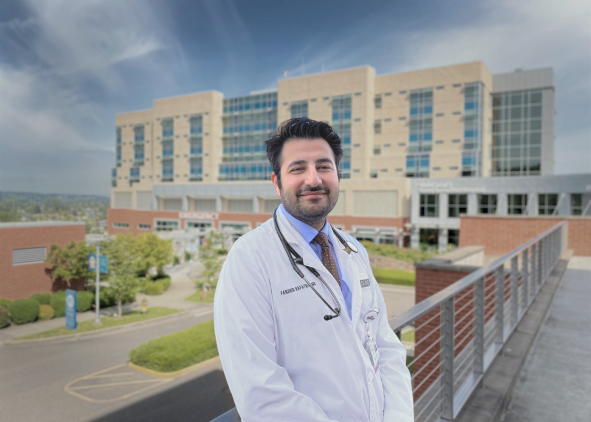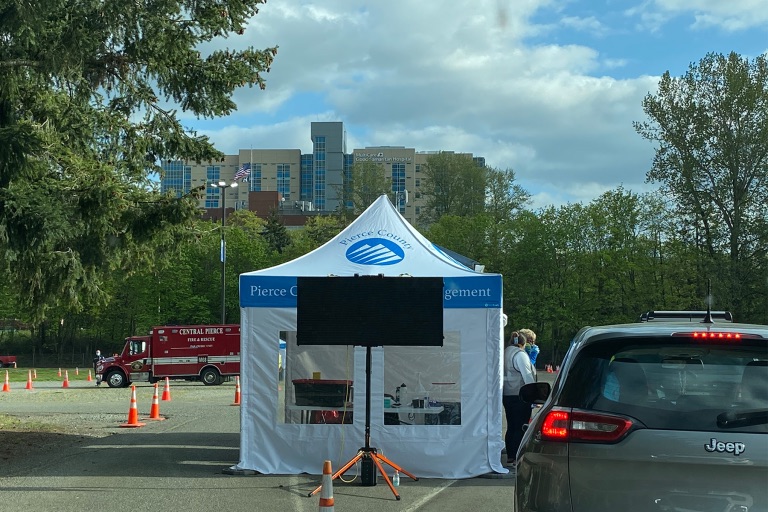
As hospitals across the nation prepared for COVID-19 last year, Dr. Farshid Rafatnia faced a complex request to create a field hospital for a potential surge of patients. Fortunately, that surge never came to Puyallup, WA. Earlier this month, Dr. Rafatnia, Chief Hospitalist for Sound Physicians at Good Samaritan Hospital, shared his experiences navigating the pandemic.
“As early warnings came in from overseas, many doctors were in disbelief that the virus would grow to a worldwide pandemic. After the first U.S COVID-19 case was discovered in Washington State, it was time to recalibrate. As cases grew in the following weeks, my director called and said there were discussions of opening a 200-bed field hospital at our local State fairgrounds,” said Dr. Rafatnia. “To prepare for the worst-case scenario, we acquired high-grade tents and equipped them for patient care.”
Dr. Rafatnia credits his local community for preventing a significant surge by staying home and heeding the calls of local health officials.
“The Pierce County community were quick to socially-distance, and it certainly helped stave an unmanageable wave. We never experienced the scenarios of running out of beds or patients having to share ventilators. There were times where we were low on ventilators, but we never ran out. And although there were discussions at the State level on how we would prioritize care, our patient volumes remained manageable,” said Dr. Rafatnia.
What the local community may not have realized at the time was that their public health efforts were not only protecting themselves but providing their local hospital additional time to be even more equipped for the pandemic. As research progressed in 2020, public health officials learned valuable lessons from the COVID-19 pandemic. Dr. Rafatnia hopes that our healthcare system and government start thinking about future preparations. A large part of this, he says, begins with mRNA vaccines.
He’s optimistic, saying, “mRNA vaccines technology presents our society with a “moon-landing-level” leap in science. The next time a virus like this comes around, mRNA vaccines will allow us to produce vaccines at a record pace, just like we did with COVID-19. The science is validated and is going to open up vast opportunities to deliver vaccines in the future. The next time this happens, we’ll be able to respond much faster with vaccines.”
Populations at risk and healthcare workers were among the first people to receive the COVID-19 vaccine. “PPE only reduces the likelihood of contracting COVID-19. After a year of trepidation when walking into a hospital room, the vaccine gave clinicians renewed confidence, hope for beating the virus and improved the well-being of my team,” he said.
This sense of relief has allowed many clinicians, like Dr. Rafatnia and his team, to begin thinking about life after COVID-19. “My wife is pregnant, and she also works in healthcare. Our fear and anxiety are gone now, and the vaccine has allowed us to live our lives with more confidence,” he said.

Vaccination at a national level is a challenging task to accomplish. Dr. Rafatnia credits his hospital staff for remaining dedicated and leading local vaccination efforts. “Volunteers help staff local clinics that at one point, administered close to 1,000 vaccines per day. Some volunteers came out of retirement, and others came to help after finishing their hospital shifts. The generosity and spirit of our community are amazing and encouraging to see,” he said.
Volunteers also helped communicate safety and reassurance in the vaccine. With widespread skepticism, many clinicians consider how to speak about vaccine safety. Dr. Rafatnia faced convincing his mother to receive the vaccine. When communicating to family or even patients, he offers, “Produce the risk calculation and present it. Claiming there’s no risk whatsoever is not as credible an approach as there is a risk with everything. Communicate that the risk of a complication is minuscule in comparison to the risk of getting COVID-19 and having a negative outcome.”
Between reflection, gratitude, and optimism, Dr. Raftania has confidence the worst is behind us. “We’ve increased awareness in public health among the general population and have learned the importance of community,” he said. Additionally, Dr. Rafatnia believes the pandemic has presented an evolutionary pressure to adapt, which has introduced new technologies, increased consideration for public health, strengthened our infrastructure and taught society how to be generous and help those in need. Despite the many trials and complications the pandemic presented, hearing such enthusiasm is undoubtedly comforting and welcoming.